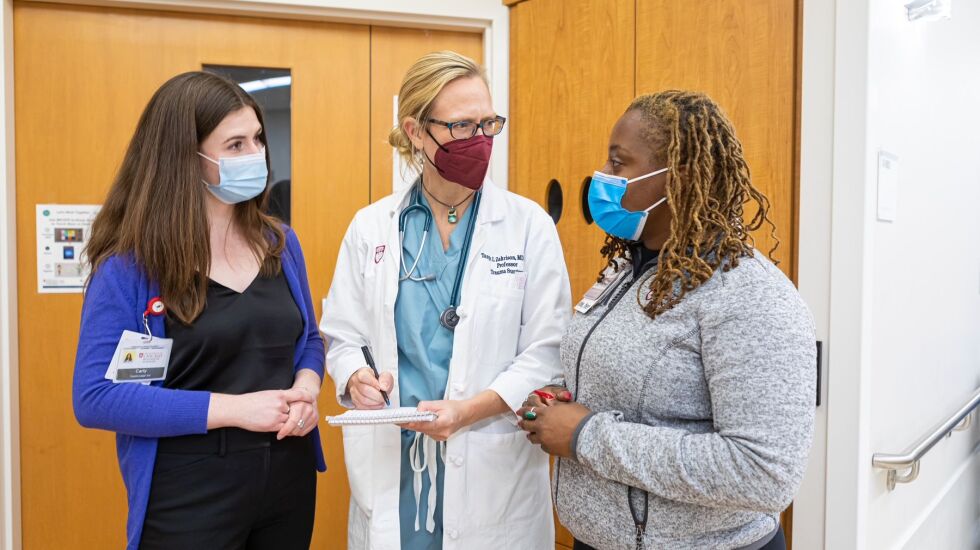
There’s another level of trauma survivors of violence in Chicago can face that goes beyond their physical injuries. They could lose their jobs — and then their ability to pay rent — or lose public benefits like food stamps while they spend weeks or months recovering in the hospital.
Enter Carly Loughran, an attorney with Legal Aid Chicago. She’s part of a new initiative at UChicago Medicine in Hyde Park that aims to help victims of violence, such as those who are shot or stabbed, with their civil legal needs.
She’s teaming up with UChicago Medicine’s violence recovery specialists who are already building rapport with patients and offering support as they heal. They screen people to see if they need Legal Aid Chicago’s help. Then they refer them to Loughran.
“When I come in, the patients are expecting me. And they know that I’m associated with a program they already trust,” Loughran said. “If a lawyer were to go in cold, especially with a population that has been given every reason to mistrust lawyers in the legal system, that exchange would go very differently.”
UChicago Medicine recently launched this program, dubbed Recovery Legal Care, with the goal of going beyond providing medical care to address social and economic wounds as well, said Dr. Tanya Zakrison, a trauma surgeon at UChicago Medicine.
“We can help people recover physically,” Zakrison said. “But how do we address this justice gap?”

Many patients who show up with gunshot wounds live in Black and Latino communities that have long been economically disadvantaged, Zakrison said. Helping them keep the social and economic fabric of their lives intact — their jobs, housing or food stamps — could help prevent future violence, she said.
Over the last roughly five years, the trauma center has treated more than 20,000 adults and children. About 40% of the patients have had penetrating injuries, such as gunshot or stab wounds, according to UChicago Medicine.
Through the initial pilot phase of the program, Loughran spends Thursdays at the trauma center, meeting with patients at the bedside. She assures them she’ll be back, as she sees the potential to build long-term relationships with some patients beyond their hospital stays. She can devote potentially months to a patient’s needs that a hospital social worker might not have.
“Lawyers are like social workers with teeth,” Loughran said.
For example, while a typical social worker may help a patient fill out an application for food stamps, they can’t represent that person in court if the application is denied, Loughran said. Her group can.
The same goes for if a landlord tries to evict a patient. Loughran is their legal advocate. Some patients might not know they can get reimbursed through a state law to cover expenses that stem from a violent crime. Loughran can help with that process, too.
She’s also training violence recovery specialists on how to help patients fill out applications for public benefits, which Loughran sees as extending her reach.
A second attorney with Legal Aid Chicago is expected to join the project next week. There are plans to add a supervising attorney and one or two paralegals.
Recovery Legal Care is mainly funded through $2.6 million in federal grants to the trauma center to cover the program for five years. The initiative initially will focus on adult trauma patients. The goal is to expand to children and adolescents, Zakrison said.
Researchers plan to study the program’s effectiveness. They want to see how much addressing their patients’ social and economic needs affects their overall health — and prevents future gun violence in particular from impacting patients and their families.
Kristen Schorsch covers public health and Cook County at WBEZ.







